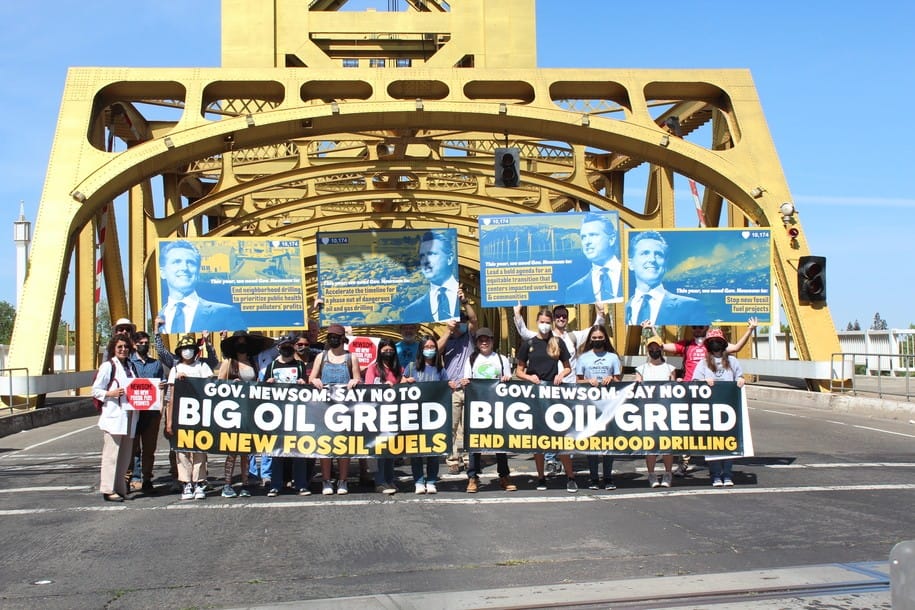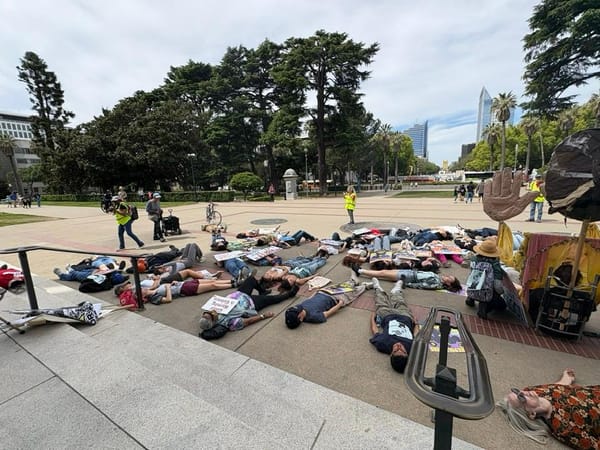80+ Groups Blast CA Climate Plan’s Reliance on Carbon Capture for Fossil Fuel Infrastructure

Sacramento, CA — On October 24, over eighty climate and environmental justice groups sent a letter calling on the California Governor and the California Air Resources Board Chair, Liane Randolph, to reject the use of carbon capture and storage (CCS) for fossil fuel infrastructure like oil refineries, gas-fired power plants, and other oil and gas operations in the state’s 2022 Climate Change Scoping Plan.
“This letter comes after new lobbying disclosure research revealed the CA CCS lobby, dominated by fossil fuel interests organized by the CA Carbon Capture Coalition, spent more than $13 million lobbying California’s Scoping Plan, Governor’s office, Legislature and the Air Resources Board in the first six months of 2022,” according to a press statement from a coalition of over 80 climate and environmental groups.
“The Governor and the Air Resources Board cannot allow oil and gas lobbyists to write our state’s climate plan,”said Connie Cho, CBE Attorney and Member of the Environmental Justice Advisory Board for the 2022 Update to the Climate Change Scoping Plan. “Carbon capture at oil refineries is a climate dead end that will keep otherwise defunct fossil fuel infrastructure polluting indefinitely at a time when we need to rapidly phase out fossil fuels.”
“It paves the way for billions in public subsidies to fossil fuel executives, locks us into the worst case climate scenarios, and undermines both the Governor’s courageous call to hold Big Oil accountable and the Board’s own prudent plans to assess and coordinate a phasedown of oil extraction, refining, and use in California,” Cho stated.
In response to growing criticism, the groups said the Air Resources Board has taken “important steps to improve the Scoping Plan: eliminating new gas plants, doubling reductions of vehicle miles traveled, and committing to an inter-agency planning process for a supply-side phasedown of oil refining.”
However, they said the Draft Scoping Plan as it stands “still trades direct climate pollution cuts for risky and ineffective carbon capture technologies pushed by fossil fuel lobbyists.”
In their letter, advocates warn that the Scoping Plan’s dependence on CCS technology at refineries, power plants and oil and gas operations will keep these polluting, climate-warming operations open indefinitely while doing nothing to lower non-CO2 pollution.
In the letter, advocates point to numerous downsides of CCS technology including:
- Fossil fuel and other polluting industries want to use CCS to continue business as usual
- CCS does not work as promised, despite decades of investment
- CCS requires large amounts of energy, which threatens California’s grid stability
- CCS increases water usage and risks polluting groundwater and air quality
- CCS–even with guardrails–endangers communities
“No community in California should be a dumping ground for carbon waste,” said Juan Flores, Community Organizer, Center on Race, Poverty and Environment. “In the Central Valley, we already have over 40 leaking oil wells in our backyards. Now, big polluters want to set up dozens of carbon capture projects, some located over or near fault lines. For us, that means new dangers of pipeline ruptures and leaking carbon dioxide wells that could contaminate our water and deprive our bodies and brains of oxygen. The best community protection is to avoid this inherently dangerous technology altogether in California’s climate plan and instead focus on rapidly phasing out fossil fuels.”
“Carbon capture would put tremendous strain on California’s already struggling electricity grid and would increase energy costs far into the future,” said Alexis Sutterman, Energy Equity Program Manager, California Environmental Justice Alliance. “Instead, California must invest in strategically-sited clean renewable energy infrastructure to replace fossil fuels, protect our health, and stabilize our climate.”
Last month, a memo released by the House Committee on Oversight and Reform shows fossil fuel executives know that CCUS technologies will “enable the full use of fossil fuels across the energy transition and beyond.”
“Carbon capture doesn’t make fossil fuels climate-safe any more than filters make cigarettes safe,” said Victoria Bogdan Tejeda, an attorney at the Center for Biological Diversity’s Climate Law Institute. “Oil industry misinformation doesn’t change the fact that carbon capture and storage technology has repeatedly failed to cut carbon emissions as promised. California’s climate plan should follow the science and rapidly phase out fossil fuels, not lay expensive bets on a dangerous, proven failure like CCS.”
The California Air Resources Board is expected to release a final plan for adoption of its Scoping Plan in November 2022 for final adoption by December. Advocates and environmental justice representatives are urging the Air Resources Board to reject carbon capture schemes funded by the fossil fuel industry in the Final Draft Scoping Plan, according to the statement.
Background: Big Oil Regulatory Capture in “Green” California
Big Oil has been able to get away with what it does in California because of the enormous influence the Western States Petroleum Association, the trade group for the oil industry, and oil companies have exerted over the media, legislature and regulatory agencies for decades.
WSPA, the largest and most powerful corporate lobbying group in Sacramento, alone has spent over $17.5 million lobbying the California Legislature and other state officials over the past three years.
In the first quarter of 2022, WSPA continued its lobbying spending spree, dumping $952,366.91 into lobbying California officials, according to the California Secretary of State’s website. Chevron spent even more money than WSPA in lobbying, $1,016,168.17, during the quarter.
Over the past four years, fossil fuel companies paid almost $77.5 million to lobby lawmakers in Sacramento, reported Josh Slowiczek in Capital and Main on May 14.
“Oil and gas interests spent four times as much as environmental advocacy groups and almost six times as much as clean energy firms on lobbying efforts in California between 2018 and 2021, according to a Capital & Main analysis — reflecting the intensity of the industry’s efforts to influence policy in a state whose leaders have vowed to build an energy future free of fossil fuels,” Slowiczek wrote.
WSPA and Big Oil wield their power in 8 major ways: through (1) lobbying; (2) campaign spending; (3) serving on and putting shills on regulatory panels; (4) creating Astroturf groups; (5) working in collaboration with media; (6) creating alliances with labor unions; (7) contributing to non profit organizations; and (8) sponsoring awards ceremonies, including those for legislators and journalists.
WSPA and Big Oil have for years worked closely with media outlets and more recently have sponsored awards for legislators and journalists.
For example, Catherine Reheis-Boyd, WSPA President and former Chair of the Marine Life Protection Act (MLPA) Initiative Blue Ribbon Task Force to create “marine protected areas” on the South Coast, was on the “short list” of nominees for the LA Times “Inspirational Women Awards” held on October 18, 2022.
Can you guess who was one of the sponsors of the LA Times awards? Yes, you guessed right — WSPA was a sponsor.
According to a tweet from @OfficialWSPA, “Today @latimes acknowledged a woman who is already well known in our industry as a trailblazer and inspiration to tens of thousands of women. Congrats to our fearless leader @WSPAPrez for being recognized as a shortlisted nominee for the Inspirational Women Awards.”
It is also no surprise that five LA Times reporters this year received “environmental reporting” awards from the Sacramento Press Club that were sponsored by WSPA, PR and lobbying firms and others.
In 2015, I wrote this article about how LA Times and the California Resources Corporation teamed up on a propaganda website: https://www.dailykos.com/story/2015/10/30/1442947/-LA-Times-and-Big-Oil-team-up-on-propaganda-website
Fortunately, the LA Times is no longer managing and running that website.



